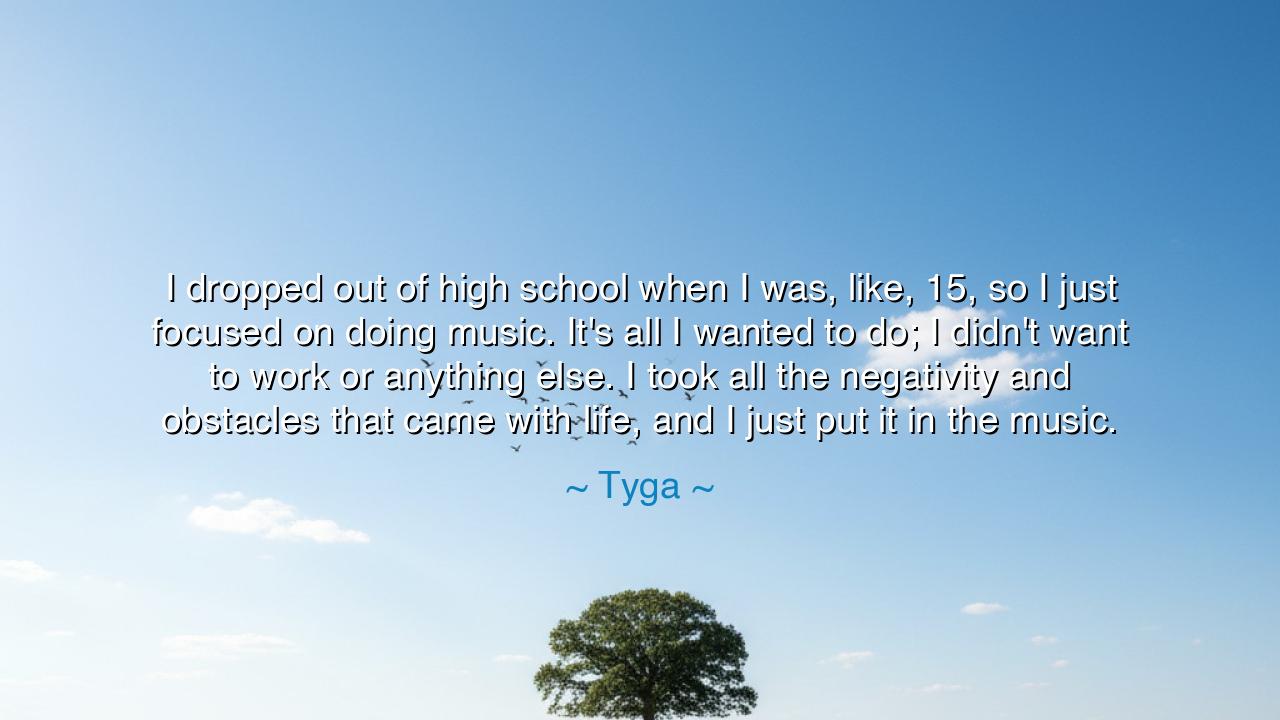
I dropped out of high school when I was, like, 15, so I just
I dropped out of high school when I was, like, 15, so I just focused on doing music. It's all I wanted to do; I didn't want to work or anything else. I took all the negativity and obstacles that came with life, and I just put it in the music.






When the artist Tyga declared, “I dropped out of high school when I was, like, 15, so I just focused on doing music. It’s all I wanted to do; I didn’t want to work or anything else. I took all the negativity and obstacles that came with life, and I just put it in the music,” he revealed the heart of a truth as old as mankind: that destiny often demands sacrifice, and that suffering, if transformed, can become the very fuel of creation. His words are not a boast of abandonment, but a testimony of faith in his calling, and of the alchemy by which pain is transmuted into song.
The ancients knew this well. They told of Homer, blind yet filled with vision, who turned hardship into poetry that outlived empires. They told of prophets who left comfort behind, driven by voices within that compelled them to speak truth. Tyga’s choice to abandon the safe path of ordinary labor and pursue music echoes this eternal pattern: the artist, seized by a calling, walks away from the common road to follow the fire within, even at great cost. His words remind us that every obstacle can either break us or be reshaped into creation.
History offers countless examples. Frida Kahlo, tormented by pain and injury, could have surrendered to despair. Instead, she poured her agony into paintings that spoke to the world of endurance and identity. Likewise, Tyga took the negativity of life—its struggles, its doubts, its obstacles—and instead of letting them bury him, he gave them voice in rhythm and rhyme. In this way, he stands among those who understood that hardship, when embraced, becomes a teacher and a wellspring of art.
The meaning of his words is clear: true success is born not from ease, but from the refusal to let hardship silence the inner voice. Dropping out of school at fifteen could have been the end of his story; instead, it was the beginning of a greater one, because he refused to accept defeat. He did not run from his pain—he used it. He channeled frustration into melody, anger into verse, longing into rhythm. Thus, the very forces that sought to crush him became the fuel for his rise.
The lesson for us is profound: when life hands you obstacles, do not curse them, but transform them. The fire that burns you can also light your path. The burden that weighs you down can also strengthen your shoulders. As Tyga shows, the key is not to escape life’s trials, but to take them, break them apart, and turn them into something that gives you power and others hope. That is the art of the creator: to make beauty out of ashes, meaning out of despair.
Practical wisdom follows. Whatever your path, do not wait for perfect conditions. Begin with what you have. If pain comes, write it, sing it, shape it into work that others can see. If rejection meets you, use it to sharpen your resolve. If life feels empty, fill it with your craft. For your obstacles are not walls to stop you, but stones to build your foundation. Like Tyga, pour your life into your art, your work, your calling—and watch it transform you.
Therefore, let us remember Tyga’s testimony: “I took all the negativity and obstacles that came with life, and I just put it in the music.” This is not only his story, but a lesson for all who struggle. Whatever form your music takes—whether art, craft, service, or labor—let it be the vessel into which you pour your struggles, until your wounds become wisdom and your hardship becomes strength. For the one who learns this truth will not only survive life’s trials, but will turn them into the very song of triumph.






AAdministratorAdministrator
Welcome, honored guests. Please leave a comment, we will respond soon